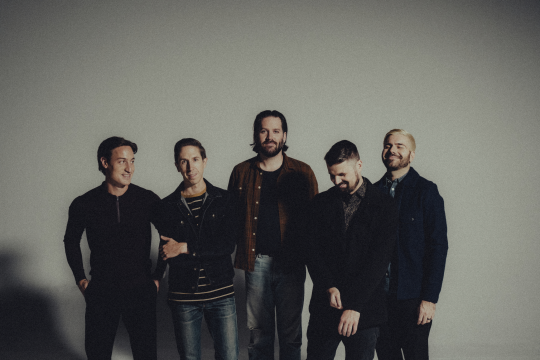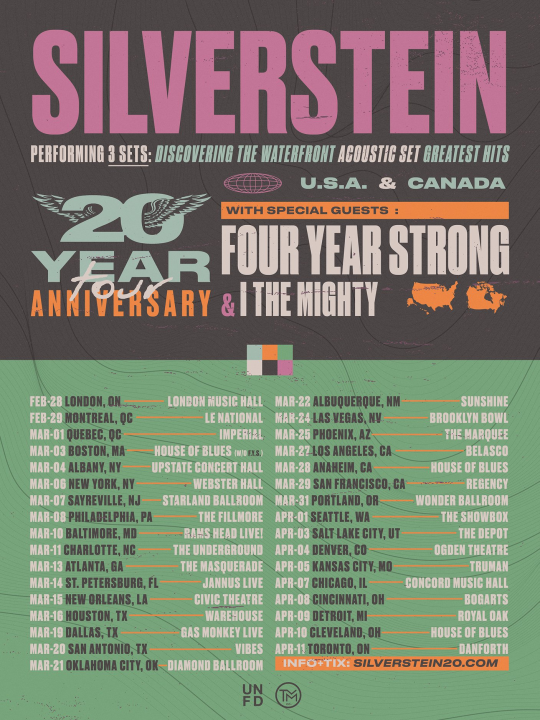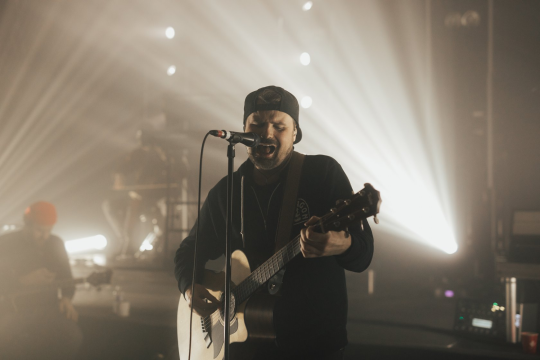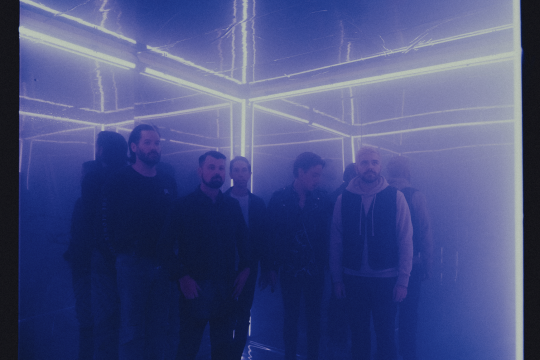
Can you think of one thing you’ve consistently done for 20 straight years? And no, eating and sleeping don’t count.
Try and think of a hobby or profession you’ve been doing for two whole decades where seemingly every year you continue to get better and better and better.
Anything? Well, guess we can’t all be Silverstein.
Gearing up for their biggest year yet as they celebrate the big 2-0, the Canadian noisemakers will be hitting North America performing three sets (Discovering The Waterfront in full, an acoustic set and a greatest hits set) and preparing to release their ninth full-length album A Beautiful Place To Drown.
In order to get a feel for Silverstein’s busy yet exciting year ahead of them, we caught up with frontman Shane Told to talk about everything from their new record to his love of the Toronto Raptors.
To see what Told had to say about one of Silverstein’s most experimental releases as well as his story about how “My Heroine” almost never made it on Discovering The Waterfront, be sure to see below. Afterward, make sure to pre-order the band’s new album before it hits stores March 6th and grab tickets to see them out on tour with Four Year Strong and I The Mighty here.

You have a lot of exciting things coming up with the 20-year tour and your new album A Beautiful Place To Drown. Which do you think you’re most excited for?
Shane Told: Oh, that’s hard! That’s a hard question, man.
Yeah, we’re starting with the tough ones first [laughs].
It’s not easy to pick a favorite there. To be completely honest, I think it’s the tour I’m most excited about because there’s this excitement to go do this thing and spend a lot of time in the live environment going to all these different cities and playing these epic sets. We’re playing like almost two hours a night and just to have those songs sang back to us, that’s a pretty amazing feeling. Obviously, the new album is super exciting too because everyone’s gonna hear this thing. But you know, we recorded it six months ago. So it’s like, for me, I’ve heard the songs a billion times already. It’s always funny, by the time a record comes out – not to say I’m sick of it – but you know, you poured over it so much that it’s like, “Okay, finally it’s out.” It’s more a sense of relief than it is excitement sometimes with new records.
Was there any part of you guys that wanted to release the record later in the year so you could focus more on the 20-year tour first?
No, not at all. In fact, it’s always been something we’ve thought was important. You know, to have that great balance between our legacy and all the things we’ve done in the past that we’re proud of and records we put out and the milestones we’ve achieved such as 20 years of the band and 15 years of Discovering The Waterfront. Those things are great. But at the same time, we’re a band that never broke up. We never went on hiatus, we never took a break. We’ve been doing this the whole time. And you know, our fans and critics tell us our last few records are our best records. So for us, it’s always important to push forward and have new stuff come out at the same time we’re celebrating the old stuff and the milestones we’ve achieved. I remember when we did the Discovering The Waterfront 10-year-anniversary tour – I guess it was five years ago. We had our album I’m Alive In Everything I Touch coming out and it was really important for us to play “Midwestern State Of Emergency” and show people “Okay yeah, 10 years ago we put out this record but we’re also making some of our best music now.” And since we made that record, we’ve put out maybe our two best albums. So it’s really important for us to do those things, I think, together. Rather than say, “Okay, yeah, here’s this 20-year-anniversary tour” and like, “Oh yeah, by the way, in a few months we’re going to work on the new stuff.” I think it makes sense to do it together so our fans are aware of it.
With you guys playing your longest set ever, will you be able to fit new music into the setlist?
Yeah I mean, we can’t play half the [new] record. But that’s just the challenge that happens when you’ve been a band as long as we have and put out so much music, you know? This is our ninth record. So when we’re playing Discovering The Waterfront in full, if we played it all the way through without talking, that’s like 45 minutes right there. So it’s interesting as you go on with a band and a career, your sets have to get longer or you have to inevitably start cutting songs out and it gets more and more difficult. So people coming out can expect us to play a couple new songs from the new record but then a lot of it’s going to be the classics and a few deep cuts in there. You know, a few curveballs just for some people that have seen us a million times and haven’t heard a specific old song. We try to do that, too. I think it’s really just, we’re trying to encompass the whole career. Not super heavy on the new record yet. We’re really just celebrating how we’ve gotten to this point with two decades.

For you personally, how do you prepare for such a long set?
I won’t lie to you. There definitely was some concern from – I’m not gonna say me – but from just everybody kind of on our team when we decided, “Okay well, 20 years is coming up, what are we gonna do?” Like, it was my idea to do the three sets. It was my idea to put together the longest show ever and I was excited about it. That’s when our agent said, “Are you guys sure? Are you guys good to do this? Like, a two-hour show?” And our drummer, he’s also our manager, he’s like, “Are we okay to do this? Like, Shane can you do it?” And I’m like, “Yeah, I’ll be fine man. I believe in myself, I can do it.” And then as we got closer and closer and the tour routing got put together, our agent put a few more days off in there. Our drummer/manager, he put in a couple extra days off in there. And I said to him, I’m like, “I’m okay. I’m going to get through this, I always do.” And he’s like, “Well, you know, for the rest of us it’s not easy either.” [laughs] So we have a few extra days off in there, just to I guess maintain a little bit of sanity and have a little bit of a breather. But you know, we already did the European leg of the tour. The North American run starts on Friday but we already did seven days in Europe. So we did two shows and then we had a day off and then we did five in a row and I got through it just fine. My voice held up great. In fact, some of the guys in the band thought I sang better than ever before. So that’s pretty exciting. We haven’t really done any touring in like six months [since] we were making the new record. It is a lot to bite off but I think I can chew it no problem.
We mean, you guys are celebrating 20 years as a band. You’re a professional at this point, you can handle this no problem! [laughs]
Yeah, and you know, [the shows] have gotten longer and longer. Like I said, you kind of have to, otherwise, you’re just going to be cutting out more and more songs. So, I think the last show we did was still like over an hour and a half, probably 90 to 100 minutes. And this one’s going to be like 120 minutes. So it’s not that much longer. You know, for me, once I’m up there and I’m in the zone and I’m feeling good, I feel like I could sing for hours. So hopefully, [everything] holds up.
Going back to A Beautiful Place To Drown, it’s certainly one of the best Silverstein records and it definitely feels like a Silverstein record in the year 2020 as you guys tried a few different things on this record. One of them being all the amazing features. Where did some of those ideas for the features come from?
Well first of all, thank you for saying that. We feel really good [about this] record. I’m glad you noticed we took a few different approaches and a few chances. When we were putting this record together, we weren’t completely ignorant or aloof of the fact that some of the stuff was a little out there for us. There were definitely discussions about songs like “All On Me” and just some of the ideas we had like, “Okay, are we really doing this?” In our career, we’ve played it safe a lot and that’s fine. But every time we have taken a chance, it’s paid off. So I think with this record, we were still careful and we still worked hard but we definitely did go for it. You know, and we did say like, “Fuck it, let’s go for it.” I think that at the end of the day, at the end of the record, we feel good about it and we think that the product is better too.
So how that ties into your question about features is interesting too because, in the past, we would always think about features and we would say, “Okay look, we have this song, whose voice would be cool here?” And it’s worked out a few times. We’ve had some great features over the years whether it’s Lights on “The End” or Brendan Murphy from Counterparts on “The Artist.” We’ve always had people come in and do great parts but there’s been a lot of them that haven’t worked out. The reason that happens is because usually, we’re so far along in the recording process by the time we say “Hey man, this could be cool to have a feature” [and] we figure out who the perfect voice is, we contact them, time has gone by, then they’re on tour then they can’t do it and we’re like, “Okay, fuck it, no feature.” That’s happened so many times. But with this record, we had most of the songs put together earlier on so we had a lot more time to give people to do it.
Oh, perfect.
For example, with “Infinite” and Aaron from Underoath – he’s a great buddy of mine – I called him and I was like, “Hey man, I think your voice would be perfect on this song. Are you into it?” And he’s like, “Yeah, I can’t do it for like three weeks or a month” and I’m like, “No problem! We can do that.” And three weeks or a month later, he sent it and it was perfect and it was great. Same with Pierre from Simple Plan, he had some time [to work on the feature] and that was great. He’s a buddy of mine, I just texted those people because they’re friends. Princess Nokia was a little bit different. She’s a huge fan of our band. We met her in New York City. She came out to our show and she was just so lovely and after she came, I became more familiar with her music and her style and everything that she does. So when we were putting together “Madness,” the track she’s on, we just thought having a female voice would be so great. And with the style of the song and the tempo we were like, “She’d be perfect!” Luckily, she was into it so that was great. And we had never done a guest guitar solo before, so [“Bad Habits”] with Intervals was fun. He’s a friend from Canada. Canada is small, we all know each other. And Caleb from Beartooth is obviously one of our best friends. So those features all came together great but another thing I want to stress: all those features are first choice features. We don’t do second choice features. We don’t say, “Oh shit, Aaron from Underoath is on tour and can’t do it? Okay, who’s the next best we can get?” Like, the feature is either going to happen or it’s not and once we’ve set our minds on somebody, that’s the perfect person for the song, for the art and that’s it. We’re not going to go down some list and list and list until we end up with someone that wasn’t the vision. So it was really cool we ended up getting all this to actually happen because so much of the time with other records we ended up having no features or just maybe one or two because some of them didn’t work out.
It’s so awesome to hear your enthusiasm for this record because sometimes when bands experiment, they might be a little unsure of things. But with you, it sounds like you got literally everything you wanted onto this album.
Yeah, I think so. I mean, we don’t go into things with this like “eh fuck it,” [attitude] you know? This is our band. This is our career. This is important to all of us. One thing that’s happened more and more as we’ve gotten to this point in the band is everyone’s words and everyone’s voice holds a lot more weight than it used to. It used to be, “Okay, I wrote this song. Here it is. It’s my fucking song and here’s how it’s going to go. It’s called ‘My Heroine’ and there it is.” And everyone’s like, “Okay, fine. I guess.” Obviously, that did great. When you go with that approach for a long time and it works, it’s fine. But then at some point, you realize sometimes there needs to be more cooks in the kitchen. Sometimes, when it’s just you and the producer or you and the songwriter and the producer – like a songwriter in the band and the producer and the singer are there – they’re missing something. They’re so into the nuts and bolts of it, they don’t see the big picture of the song. Then somebody from the back of the room that’s maybe only even half-listening jumps in and goes “hey, what about this?” and it just opens a whole new thing for the song. That’s something we never used to approach the same way. But we have so much respect for every member of the band and everyone in the band’s opinion that I think it really helps the record be what it is. But it was never like a “eh fuck it, whatever, let’s put a saxophone solo in here. Who cares?” It was never that. Everything is as calculated as you can imagine.
For all the fans reading this thinking “Oh my god Silverstein’s going to put out this crazy experimental record” A Beautiful Place To Drown is still very Silverstein. “September 14th,” sounds like something you could have released 10 years ago.
I think you’re right, for sure. There’s something about my voice that just screams Silverstein. It doesn’t matter what I do, what I sing on, what we write. The second it’s me singing over top of it, all of a sudden it just reverts to sounding like our band which is interesting. I think a lot of people when they listen to music, they don’t really listen to much else other than the vocals and then everything else is just an accompaniment. So a lot of people don’t hear it as much, some of the layers and layers of experimental things we’ve done. They just hear my voice and then they say it sounds like every Silverstein record. So there will be people like that and then there’ll be other people who hear an 808 or some kind of clap sample or anything like that we haven’t done before instrumentation-wise and it’s really going to freak them the fuck out. So, you know, we’ll see what happens. But I thought “Infinite,” the first single, I thought that was one of the freakier songs which is part of why we went with it for the first single. And like everybody loved it. So, it’s great when you can read YouTube comments and not want to kill yourself.
One song we found ourselves listening to over and over again is “Say Yes.” It’s not your typical Silverstein song by any means and almost feels like “The Afterglow.” It’s a great example of you guys exploring and expanding your sound.
I think so. That’s another reason we feel so good about this record. We put out “Infinite” as the first single, “Bad Habits” as the second single and “Madness” will be the third single. So you know, it’s crazy that before this record’s out we’ve left off, in my opinion, maybe two of the strongest songs that work as singles which to me are “Where Are You” and “Say Yes.” So it’s really cool to be able to have the label pick the singles and then leave out two of the songs that you thought were a hit. That’s a good sign you have a strong record. So yeah, “Say Yes” is a funny one. And again, that’s a great example of what I was talking about with my voice. Paul Marc [Rousseau] wrote that song and he sent it to me and he was singing lead on the demo. I remember hearing it in the car and going “Oh god, I don’t think this is Silverstein. Like, I don’t think this is us. I think this is too poppy.” Then of course, Paul [Koehler] played drums on it, beats the shit out of the drums. We get real fuzz bass on there and then when I sing it’s like, “Oh yeah, this is kind of just like ‘Afterglow’ part two” or it’s in that realm and it totally works. That was another thing in the studio we definitely were hyper-focused on of how do we make songs the best it can be and something that our fans are going to be like, “Fuck yeah, I can’t wait to get to track eight” or whatever.
Talking about “The Afterglow” and how it helped open doors for songs like “Say Yes,” was there any hesitation writing and releasing that song on Dead Reflection?
You know, I think I did a little bit. I remember that being a demo we had and it was just, to me, it didn’t really sound like Silverstein either. It was still really driving and really fast like, the tempo of it. To me, it was still kind of a punk song, you know? So I was like, “Okay, this is cool” and I just thought it was a great song. So we weren’t sure what was going to happen. Again, that song wasn’t released before the record came out. It wasn’t a single. It wasn’t until the album came out that people started freaking out about the song when we were like, “Oh shit, we should probably maybe play this live” because we weren’t playing it live either! So I’ll never forget the first time we played it live was in Germany. We were doing this kind of underplay tour – usually in Germany, bands play like four or five shows – we played twenty. So we were driving like 25 minutes and playing a show in like in 500 cap rooms and we played that song for the first time and the place just exploded. We were like, “Oh, we have to play this every show. Like, we have to.” So we did and every time we play it, it’s insane. Everyone goes crazy for this song. So it’s interesting how you never know really until a record comes out and maybe “Say Yes” is going to do that again. Maybe it’s going to be “Where Are You” or maybe I’m wrong and maybe I don’t know. But I mean, it was the same thing with “My Heroine.” “My Heroine” almost didn’t make the record. Like, the producer didn’t like it, the band wasn’t sure about it and I thought it was like the best song I’d ever written. Then the record came out, there was no talk of making a video for that song, no talk of it being a single, and then about two weeks after the record came out everyone’s like, “Okay well, we better learn it.” I’ll never forget Josh practicing that intro/clean guitar part in the dressing room over and over again because it’s a hard part. That’s again, that’s a song, where would we be without it?
Wow, that’s interesting. It must be cool 20 years later, you still have songs you’re excited to experiment with and see what the fan’s reactions are going to be. So many bands in your position could just play it safe and put out songs like ones people have liked in the past. So to have that opportunity to give your fans something new and fresh is awesome.
Completely, man. That’s the thing, we could write another – I don’t know, pick a song, “Smashed Into Pieces” – like we could write [another] song like that. I could definitely go into my little home studio and I can bang out a demo right now and I think people would really, really like that. We’re still capable of that but we also have eight albums that have done that. Eight albums that we really like and we still play. That’s the side of our band we enjoy. We don’t retire songs. Like, we just played our entire first record from start to finish last year. We did the tour and then we extended the tour. We did more shows and we loved every second of it. Some people love our old stuff, we love that style and we could do that. Maybe we will do that again or something but right now we’re having so much fun experimenting with things, trying new stuff, collaborating with people. It’s cool to see some of the people come out of the woodwork just being like, “Who is this band? What? They’ve been a band for 20 years? I’ve never heard of this band. This is amazing. I love it.” So it’s cool to have that and I know our real fans still hear, like when you talked about “September 14th” or a song on the record like “Stop” or “Bad Habits” or the bridge on “Coming Down” is the most Silverstein emo – like that could definitely be on Discovering The Waterfront, that part. So there’s always going to be those things for our fans and we’re never going to turn our back on our fans. Like, we’re never going to stop playing our old songs or anything.

Lyrically, since a lot of Silverstein’s records have concepts around them, was there anything conceptual about A Beautiful Place To Drown?
Not intentionally. It’s interesting because we didn’t write the record like that. A lot of our past records have been written [where] we get all the music together and then it’s kind of my job to put together a story, a concept, a bunch of lyrics, you know, whether it’s This Is How The Wind Shifts or Shipwreck In The Sand or I’m Alive In Everything I Touch. Those records are all concept albums and they lean heavily on an idea and a concept but this record wasn’t written like that. If Shipwreck In The Sand is one concept, this record is 12 concepts. I think once we started putting all these songs together – Paul Marc did a lot of the writing lyrically on this one – we started to see some commonalities between the subject matter of the songs and how much it was about the current state of the world we live in and how things like politics and mental health and relationships and the way your phone seemingly controls your life, all of these things are really, really tying together. And there’s so much progression and there are so many beautiful things happening out there in the world, like there really are, things are getting better and easier. But then why are so many people struggling and feeling so [bad] mentally? You know, why are so many people struggling? So that’s kind of where I think the title came from, you know, with A Beautiful Place To Drown. There’s a lot of water references in the band. I mean, we’ve always been a kind of water band so that just works for us and our whole M.O.

That’s definitely a really interesting concept to think about. A lot of fans are really going to be able to, no pun intended, but dive into the record and kind of explore those themes.
Well, you know, I hope they cannonball into the record. Like Ron Burgundy style.
[Laughs] that’s a good one. You know, we wouldn’t have been surprised if you were to say, conceptually, the record is somehow about the Toronto Raptors winning the NBA Finals.
Well, what’s the drowning? That Kawhi [Leonard] left?
Oh, possibly. That’s a good point.
Well hey, [the Raptors] got what the second-best record in the NBA right now? They’ve won like 19 out of 20 games or something crazy. They’re hot, man. Don’t rule them out for a repeat. Everyone’s rolling their eyes when I say that, but hey, the only team with a better record than them is the Bucks. Maybe the Lakers. It was exciting up here when the Raptors pulled it off. It was like nothing the city had ever seen before. I’m a huge Raptors fan. I’m wearing a Raptors hat right now.
Did any part of you want to put references to the Raptors or the championship in any of your songs?
You know, it’s funny because Paul Marc, he’s a hockey fan. He’s a Montreal Canadiens fan. And with basketball, he’s more of a newer basketball fan than I am. You know, I was rocking the Raptors in ‘95 even when they played in the huge baseball stadium. I’ve been a huge fan since the first season. So you know, once the Raptors started getting good, we started watching it together on the bus and talking more about the game. Then [Paul Marc] writes “Say Yes” and he writes the line about “I’m a half-court shot after the buzzers gone,” and I’m like, “Dude! You’re writing lyrics that I should be writing. Like, I’m the basketball guy here.” But now he’s such a diehard Raptors and NBA fan, so it was cool that he came up with that line.





